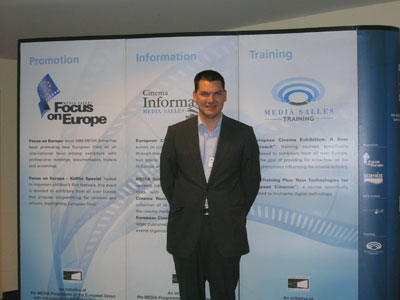
International Edition No. 9- year 1 - 7 April 2006
***
PRESS RELEASE
From theory to practice with a careful eye
on the effectiveness of digital projectors and servers but, most of all,
on the new business models and various financing opportunities for a digital
changeover “accessible to theatres”. Just as Glenn Wastyn
pointed out, “the course tries both to accompany and to anticipate
exhibitors’ requirements. In 2004 the questions posed by potential
users of digital screening technologies regarded mostly the quality of
the image. In 2005, attention had shifted more to the question of standards.
In the meantime, last summer DCI specifications were published. Now what
is felt to be the crucial aspect is that of the business model”.
The day opened with a session devoted to “hands-on” acquaintance
with the equipment needed for digital projection in cinemas, during which
Nicolas Hamon, Service Operation Manager for Barco Digital Cinema, and
Paul Clark, who covers the same position for Eastman Kodak, explained
the processes of installation and programming, besides monitoring and
assistance for optimum functioning of the projector and server.
A session held by Denis Kelly, Director for Europe of Eastman Kodak Digital
Cinema Activities, explained how exhibitors can equip a theatre for digital
screening by using integrated solutions.
Next came the problem that exhibitors are most concerned about: the changeover
to digital – who pays? To answer this question, Alastair Tyler,
for the Royal Bank of Scotland, and Karl Vervaeke, Zone Manager for ING
Lease, took the floor. “The investment for fitting out a screen
for digital projection comes to around 80,000 euro”, stated Tyler.
“If we consider that, from an initial estimate of demand, it turns
out that in Europe around 3,000 theatres are interested in shifting to
digital, the total expenditure comes to about 250 million euro. Our bank’s
approach is to develop with each exhibitor the solution best suited to
his/her own situation”. Judging from Vervaeke's talk, operational
lease appeared to be the most suitable means of financing the theatres'
transition to digital. "ING can provide tailor-made rental solutions
for exhibitors: the monthly amount to be paid by the exhibition company
may be higher during months when cinema-going is at its busiest and lower
in the quieter season".
Bernard Collard, General Manager of XDC, explained the solution proposed
by the EVS group for facilitating the transition to digital: renting cinemas
different offers of hardware according to their screen size, at a monthly
rate that varies from 500 to 1,500 euro and that includes the possibility
of using the equipment for the projection of alternative content.
Tom Cotton of Technicolor Digital Cinema, presented a high level overview
of the Virtual Print Fee based business model – a model which has
been deemed to be fair and financially equitable to all parties involved,
as well as describing the current status of Technicolor’s US roll
out, and its strategy for Europe.

Jan Petersen, IT Manager of Nordisk Film
Biografer,
at the 2006 “DigiTraining Plus” course
MEDIA Salles, a project operating within the framework of the European Union's MEDIA Programme, with the support of the Italian Government, fosters theatrical distribution of European audiovisual products, both by high profile campaigns involving Europe's cinema exhibitors and by initiatives to raise the visibility of European productions with industry players and potential audiences, creating specialized information channels on a global scale. Thus the current initiatives from MEDIA Salles dovetail in a program with a triple focus – training, promotion and information – and maximum combined effect.
MEDIA Salles
Via Soperga, 2 – I-20127 Milan
Tel.: +39.02.66984405 – Fax: +39.02.6691574
E-mail: infocinema@mediasalles.it
Website: www.mediasalles.it